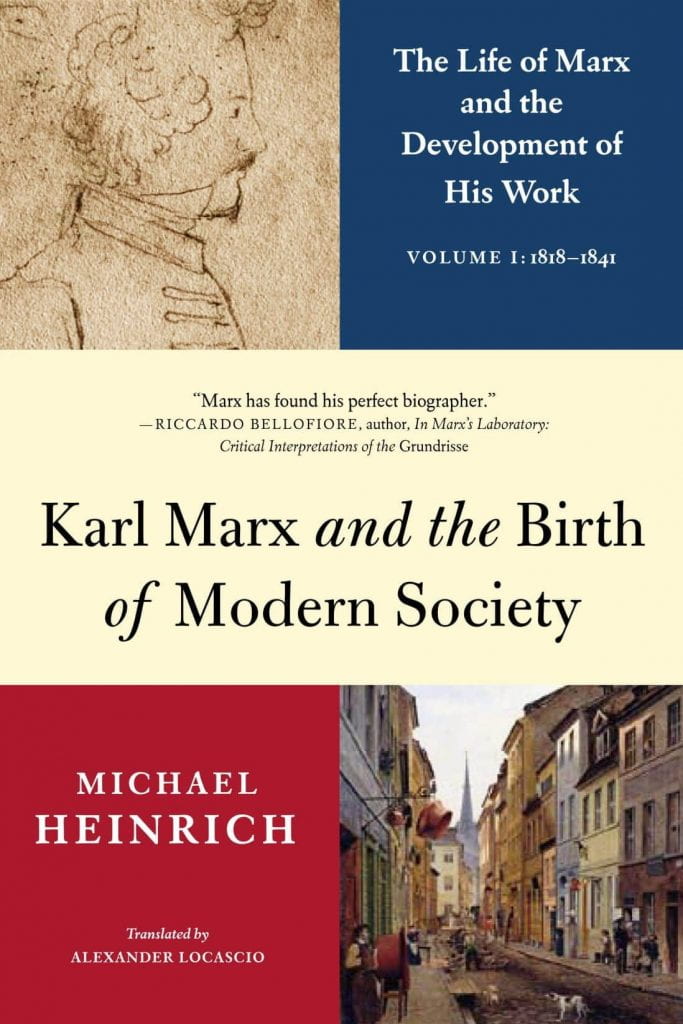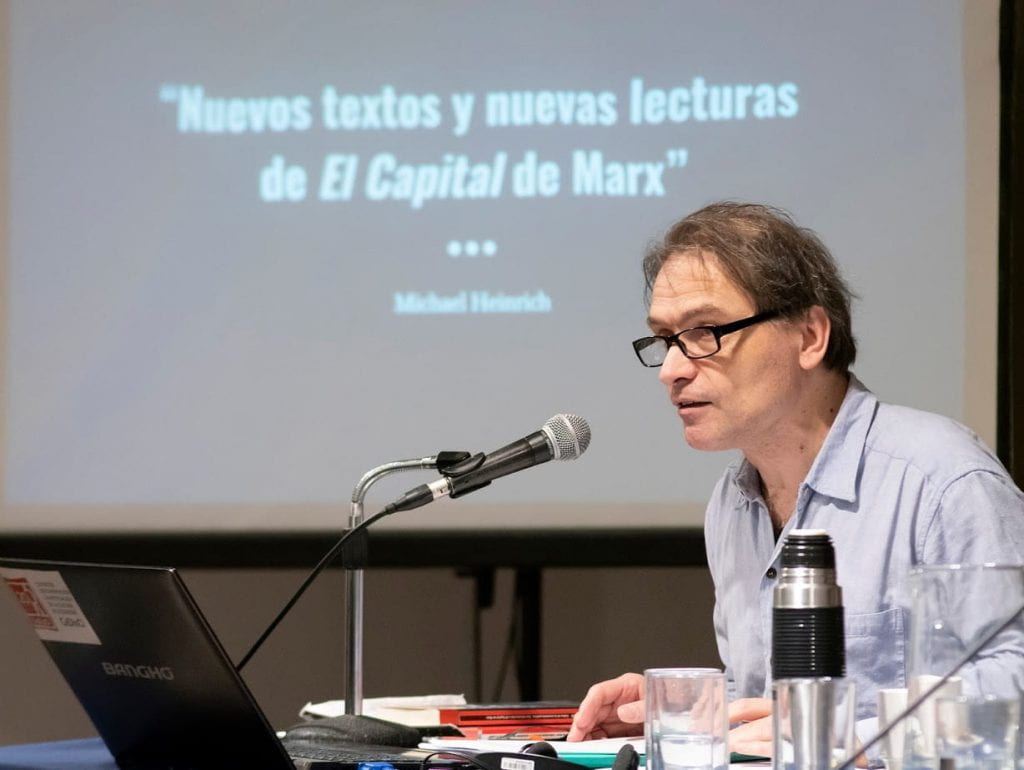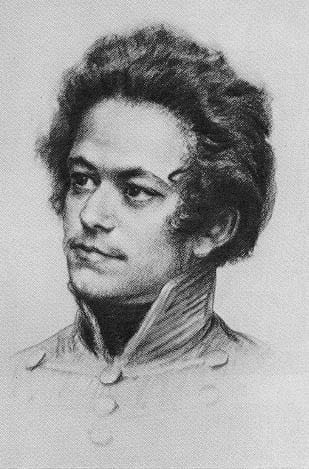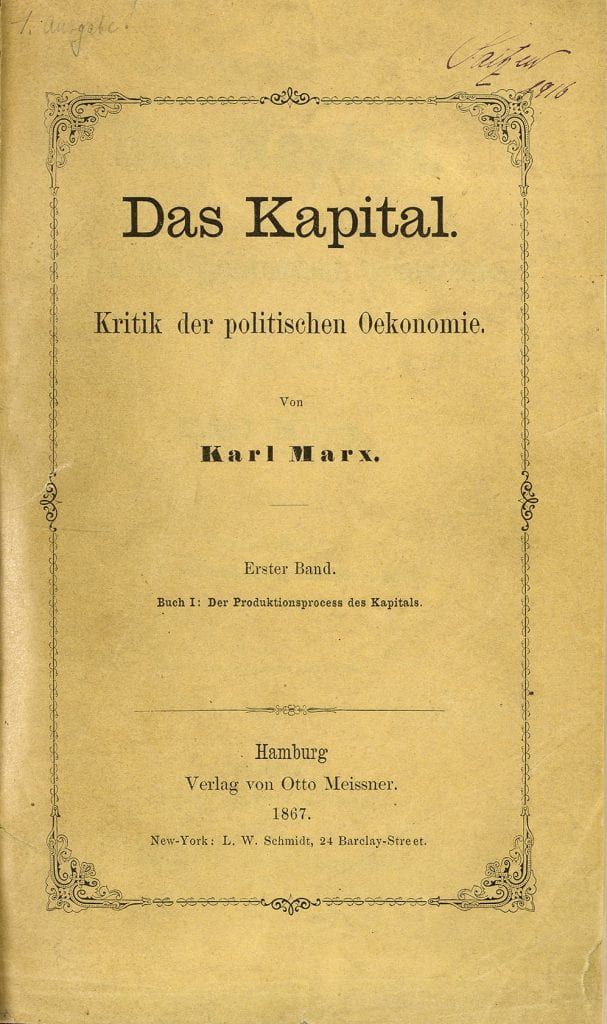In 2019, Michael Heinrich published Karl Marx and the Birth of Modern Society: The Life of Marx and the Development of His Work, the first installment of a biography that is planned to stretch across three volumes. Kathrin Witter interviewed him about the book.
Kathrin Witter (KW): Until recently, you were best known for your theoretical introductions to Marx, including An Introduction to the Three Volumes of Karl Marx’s Capital. What inspired you to write Karl Marx and the Birth of Modern Society, a biography that covers the life and work of Marx from 1818 until 1841?
Michael Heinrich (MH): The theoretical foundation for this introductory work can be found in my book The Science of Value, of which an English translation will be published with Brill next year and which deals with the evolution of Marx’s works following his dissertation in 1841 with an emphasis on his critique of political economy. For that book, I already had to dive into his biography to some extent, in order to shed light on the background of his writings.
In my diploma thesis in 1982 (which was published in a shortened version in Capital & Class in 1989), I traced the evolution of Marx’s understanding of capital from the Grundrisse to Capital, and I realized that one cannot simply isolate individual texts from Marx’s larger oeuvre. On the contrary, one has to consider every text in the context of Marx’s complete body of work. In a sense, I was thus already preparing for a book connecting Marx’s biography to the development of his thought—I just didn’t know it yet.
Realizing this fact required some biographical coincidences, or rather, contingent events. For example, in 2006 a good friend of mine asked me if I knew a good biography of Marx. I had a lot of complaints about the ones I knew, and when I looked at the ones I didn’t know, I couldn’t find one that I would wholeheartedly recommend. So, I started thinking about what a good biography of Marx would look like, at first without wanting to write one myself. What finally convinced me to tackle this project were two major insights.

First, the desolate state of research on Marx’s biography. Over the years, people have added a number of legends and half-truths to the more or less verified facts about his life. Biographers just copied other biographers, without revisiting the archival documents. New insights, published in the apparatus of the MEGA and some of essays about Marx’s life and work published in rather obscure places, were often neglected.
Second, I realized that his works had to be placed into their historical context with more emphasis than others had done before, but without reducing their existence to these contexts and thus without declaring them obsolete.
KW: What are the biggest problems with the numerous biographies of Marx, in particular with the English-language ones by David McLellan (1973), Francis Wheen (2008), Jonathan Sperber (2013), Gareth Stedman Jones (2016), and Sven-Eric Liedman (2018)?
MH: Wheen’s book focuses mainly on Marx’s private life and contains a lot of made-up stories. I don’t think it is a serious biography. Considering its time of publication, McLellan wrote a very good book, but he sees the late Marx through the eyes of the early Marx. The main problem with his biography is that it was published in 1973—before the second edition of MEGA, which contains several drafts, excerpts, letters to Marx, and biographical information that were previously unknown. McLellan simply couldn’t take these into account. Sperber is a well-known historian and like any other historian, he offers a great number of sources for his claims. But his claims are not always supported by the material he refers to. Sperber is an expert on the political history of the 19th century, but less so on philosophy and economic theories. His knowledge on Hegel seems to be mainly drawn from J.E. Toews Hegelianism—a solid book, but a rather shaky foundation for making such far-reaching claims on the relation between Marx’s theory and Hegelian Philosophy. Also, his understanding of Marx’s Capital remains superficial. It is reasonable to ask how much knowledge and understanding of Capital one needs to write a biography. But in his introduction, Sperber makes it clear that he understands Marx as a figure of the 19th century, and that he therefore doesn’t think Marx’s theories can help us understand the 21st century. If that is his claim, though, he should have read these theories a bit more closely. To some extent, the work of Stedman Jones is similar. The somewhat programmatic subtitle of his book reads Greatness and Illusion. However, he ascribes more illusion than greatness to Marx. Steadman Jones is known for his contributions on intellectual history, but similar to Sperber, economic theory is not his strong suit. Like Sperber, he neglects recent debates on Marx’s Capital, yet claims that the latter’s program ultimately failed.
The best recent biographical work on Marx is certainly Liedman’s book. He deals with Marx’s work against the backdrop of debates over the last 30 years, but one could critique it insofar as it cuts short on some aspects of Marx’s life.
KW: One of the main problems of intellectual biographies is to define the relationship between the protagonist’s life and their intellectual work. How do you assess the link between the two aspects in the case of Marx? His life was partly dominated by political conflict, in which he was often directly involved. How important is it to have knowledge about Marx’s life in order to understand his work?
MH: I would say that there is a close relationship between his life and his writings. Of course, you cannot solve problems like how to prove the tendency of the rate of profit to fall by simply looking at Marx’s biography. But to understand the history of his work, and particularly why he started but didn’t finish so many new projects, it is necessary to look into his biography. Until today, critics and Marxists alike have often neglected the fact that all of his works were meant to be interventions into the political conflicts of his time. However, it’s not sufficient to deal with these conflicts and controversies on a general historical level. Marx delivered specific interventions that were quite different from those of other commentators. To speak appropriately about the development of his work, you have to take into account the ever-changing horizon of problems he dealt with, his changing enemies, and the specific source material he drew on. And in doing so, you already find yourself in the midst of his biography.
On the other hand, Marx’s biography is influenced by the development of his work: new insights led to new strategies and alliances, provoking in turn the dissolution of friendships and intense personal conflicts. The histories of his life and his work are reciprocally connected. To inquire into this relationship, it’s important to take into account his correspondences and his numerous excerpts. We now have the opportunity to do this kind of research because, in addition to the letters thatMarx received, his excerpts are part of the newly published MEGA. But looking into this is not an end in itself. In contrast to Sperber and Stedman Jones, who try to substantiate their claim that Marx’s works and ideas are mostly obsolete by historicizing him, I want to understand which parts of his works are stuck in the debates of his time and which transcend these debates, and which of the problems he dealt with are also problems of our time. In short: the ultimate goal of my ‘historicization’ of Marx is to update his thought for the contemporary world.
KW: In your book, you emphasize the fragility of Marx’s intellectual biography but also argue that Marx was able to quickly adapt to the drastic changes of his time. He was able to recalibrate his thinking while simultaneously posing the most penetrating questions. Could we read this determination, this preservation of a critical mind in adverse circumstances, perhaps as something like the essence of Marx?
MH: Marx was certainly keen on constantly gaining new insights. He also intended to think politically and revolutionary. Yet this is also true for some of his allies, and even for some of his foes, like Bakunin. Therefore, this is a somewhat vague statement about Marx. But it is important to understand and research how this determination developed over time—and with this, we are back to the fragile and contingent parts of his biography.

KW: In the annex to your book, “How Is Biographical Writing Possible Today?,” you write about the deconstruction of the subject, in a vein similar to the proclamation of the “death of the author” in literary studies by Barthes and Foucault or Bourdieu’s radical critique of biographical writing. Here, you emphasize breaking points and contingencies, and the importance of keeping them visible against the biographical fiction of teleology, and you speak in favor of Foucault’s method of discourse analysis. Yet formally speaking, you defend an emphatic notion of the individual throughout the book, and your project could thus also be understood as a counterpoint to the aforementioned poststructuralist methods. How would you describe your relationship to poststructuralism?
MH: Poststructuralism revealed a set of weaknesses in widely-held beliefs across a range of different fields of research. However, I am not always convinced by the proposed alternatives. The question of subjectivity is a good example. The concept of a subject which is the center of its actions, an entity in time, accessible to the biographer via the use of as many personal documents as possible—today, all of these assumptions appear naive. Still, most biographers, including those of Marx, work that way. But what consequences can be drawn from the poststructuralist critique of biographies? That all biographies are fiction? That we can’t speak of subjects, only of formations of discourse? These conceptions are just as misguided as the idea that history (both political and intellectual) is made only by great men.
On the other hand, I don’t support an emphatic theory of the individual, as you put it in your question. I realize that individual people are bound by structures and discourse, which have to be carefully assessed. Foucault’s Archeology and Genealogy can help a lot with this. But individuals can also transcend structures and discourses, and the possibilities for doing so arise from both subjective and objective conditions. The skills and accomplishments of the individual are not naturally given, they are mediated in manifold ways. And that’s not all. As a historian or biographer, you have no immediate access to a historical individual—for one because there are many blind spots in the knowledge that is accessible about any single person, but also because the biographer’s approach is influenced by its specific historical context. In other words: how a certain historical individual is able to transcend discourse and time depends not only on the actions and contributions of the given individual, but also on the perspective of the biographer. In sum, I maintain the existence of a coherent subject, but I also emphasize that a biography contains mediations, breaking points, and contingencies and dispute the idea of an unmediated access to the subject. Biography should not aim to reveal the “essence” of the person Marx; rather, it is about the permanent, contradictory, and often ruptured process that characterizes the constitution of a particular person under particular social conditions and conflicts.
KW: In the book, you write that you want to discuss whether Marx was “Eurocentric,” and whether he managed to emancipate himself from that view. Regarding his early works about India, would you say that he had Eurocentric views that he needed to overcome? Or was this historical-philosophical speculation an expression of a materialist universalism? I am specifically thinking about his assessment that India’s pre-industrial infrastructure never enabled the proletariat to organize and emancipate itself. Put provocatively, if this is indeed Eurocentric, would that be a purely negative thing? In other words, how important is the idea of a universal historical trajectory for social critique?
MH: Marx’s essays on India from the 1850s are Eurocentric in two ways. First, the developments in Europe are seen as the only path towards freedom and emancipation. Second, Marx assumes that the populations of Asia were too passive, too confined in their conditions to spark any change. Both of these premises changed over time, however. Especially the Indian uprising of 1857 convinced him to overthink his second assumption. And his ethnological and historical studies from the 1870s led him to realize that his first assumption was untenable as well.
A certain infrastructure, a certain level of technological development makes communication and organization easier, but we should be careful when it comes to technological determinism. A liberated society has to overcome existing power relations. This is not a question of technological development or industrial production. Today, we need industrial production to feed the soon to be 8 billion people on earth, and to provide a standard of living beyond mere survival. But emancipation can start in a rural community, which is one of the insights Marx gained in the 1870s. I would thus be careful regarding the idea of a “universal historical trajectory” you mention and would counter as follows: is the assumption of a “universal historical trajectory” perhaps a hasty generalization of very specific circumstances? In his letters from the late 1870s, Marx shows himself quite skeptical about broad assumptions like that.
KW: In the theoretical discussions of this first volume of your planned four-volume biography, you obviously focus on Marx’s early philosophical efforts, especially on his engagement with Hegel and his followers, and the religious-philosophical debates of his time. You claim that these early years are very important for Marx’s intellectual development later on. What are the most formative factors?
MH: Early on in his life, Marx encountered enlightened-liberal thought through his home and his school, especially through his father’s friend Ludwig von Westphalen. In his last school years he discovered Romantic literature, which was important for his attempts at poetry. His literary ambitions came to an end when he moved to Berlin and studied Hegel’s critique of Romanticism for the first time. It’s widely known that Marx became interested in Hegel’s philosophy; however, up until now, no one could explain convincingly why this happened. I think that he started to read Hegel closely because of the intellectual crisis he faced after reading the latter’s critique of Romanticism.
The timing of Marx’s turn to Hegel is important, too: Hegel was criticized by conservatives who increasingly viewed him as a subversive thinker. But he was also criticized by some of his more radical followers, who wanted to go further in critiquing religion and the state. The critique of religion in particular became more and more important. But not—as it’s often said— because people wanted to avoid the critique of politics. Prussia was deemed a “Christian state,” so the critique of religion was inherently also a political question.
Since 1837, Marx was friends with Bruno Bauer, a Hegelian theologist, who became more and more radicalized over the span of a few years. The Marxist tradition has often underestimated Bauer because it has only recognized the critique of him that Marx’s articulated in The Holy Family and The German Ideology. These passages, however, don’t explain why Marx and Bauer were so close between 1837 and 1842. And the critique of religion remained important in Marx’s works. If you read Capital carefully, you can find many explicit and some implicit theological references. Their purpose was not to loosen up a seemingly dry plot but rather to serve in an explanatory function in Capital.
KW: You criticize Engels’ understanding of “Left- and Right-Hegelians” as an opposition of “system” versus “dialectical method,” arguing against this binary of system and method and, more generally, questioning the widely accepted categories of Young and Old Hegelians. What does that mean for Marx’s work and the often somewhat naive emphasis on the development in his thought from idealism to materialism?
MH: The most common stories told about this period are filled with oversimplifications. Most of the time, Left and Right Hegelians are identified with Old and Young Hegelians. Left and Right Hegelians debated religious-philosophical questions in response to Strauss’ text The Life of Jesus. Old and Young Hegelians debated Hegel’s philosophy at large. The latter opposition in particular is way too simplified to understand the specific differences that mark the school of Hegelians in the moment of its dissolution. In the literature that addresses this question, there is no agreement on who is “Old” and “Young”.
Marxists have largely adopted Engels’ distinction between a Hegelian “method” and a Hegelian “system” without examining if this separation is actually valid. The specific political intention behind Engels’ writing on Feuerbach is also neglected. Engels didn’t put forward an in-depth philosophical examination but rather an argument against Neo-Kantianism as it emerged in late 19th-century Germany. His assumptions in The End of Classic German Philosophy (rightly, he doesn’t use the term “German Idealism” here) are based more on his personal memories than on an actual analysis. His intention was to show that one could draw very different conclusions from this “ending” than the Neo-Kantians did. We should not too readily categorize Hegel’s philosophy as “idealism,” at least not based on the definition of “idealism” that emerged in the second half of the 19th century and that is often projected back to the beginning of the 19th century. For Hegel, “idealism” meant conceptual work rather than what today’s common understanding thinks it is: a counter-philosophy to materialism. In that sense, it would be a blatant simplification to frame the development of Marx’s criticism of Hegel as a transition from idealism to materialism.
Just as with Marx, we have to be very critical about a great deal of Hegel’s reception and dispel a variety of myths and misunderstandings. Especially Marxists should not reduce Hegel to his relation to Marx, but rather start with understanding Hegel as a philosopher of his time. Only then the meaning of Hegel’s philosophy can be understood in a way that advances beyond the usual tropes, such as that Marx placed Hegel or the dialectic on its feet. Digging deeper would not only require considering the different stages of Marx’s critique and affirmation of Hegel, but also questioning to what extent this affirmation was adequate.

In the second volume of my biography on Marx, I will deal with the question of materialism as well as the question of communism, which is inherently connected to it. I want to show that when Marx speaks of materialism, his aim was to discuss communism, and not the ontological relation of mind to matter.
KW: Your book is titled Karl Marx and the Birth of Modern Society. You assume that there is a continuity that has characterized economic organization since the 19th century, namely capitalism. In what ways does late-modern postindustrial capitalism today differ from the capitalism that Marx witnessed, and how does that impact Marx’s critique?
MH: If you compare the capitalism of the mid-19th century with present-day capitalism, you can see a great number of differences, ranging from the technology used over the organizational forms and the degree of internationalization evident in the structure of the monetary and credit system to the nature of state economic policy. However, very many of these seemingly profound transformations can be analyzed without much difficulty by using Marx’s categories. Central aspects of the operational organization of the capitalist production process were summarized by Marx in the first volume of Capital under the rubric of “the production of relative surplus value“ (division of labor, use of machinery) and, in the third volume, in the chapter on the “economization in the application of constant capital.” The former increases the rate of surplus value (and, as a consequence, the rate of profit), while the latter increases the rate of profit without changing the rate of surplus value. What we see in the 20th and 21st centuries—Taylorization, Fordism, automation, Toyotism—can easily be grasped by using these categories.
Regarding the form of wages, Marx already recognized the fundamental importance of the difference between time wages and piece wages. In the former, the capitalist must employ supervisors and control mechanisms to ensure a fast production process and high product quality. With piece wages, the workers themselves are interested in speed and quality; the capitalist in turn saves considerably in control costs. When today parts of the workforce are released into (bogus) self-employment, where they receive the majority of their means of production as well as their orders from their previous company, then they are, in fact, still wage workers producing surplus-value—it’s only that the company avoids the costs for the usual social safeguards, at least in Western Europe (paid vacation, sick pay, social security contributions). The social condition that Marx analyzed as “piece wage,” where the workers independently optimize their own work process in terms of capital, is taken to the extreme here.
To analyze the financial markets, Marx developed the category of “fictitious capital”: claims to payments are given a price (without having any value) and thus become a commodity sui generis. As a consequence, according to Marx, real capital doubles: it executes the movement M-C-M’ in capitalist commodity production, but, at the same time, it circulates as a claim to interest or dividend payments in the form of shares and bonds with a price. Today’s important financial derivatives (options, index certificates, etc.) continue this process and expand it: in the case of stock options, for example, we are dealing with claims to other claims that are traded and receive a price: a share is the claim to a part of the profit of a company, whereas a stock option is the right to acquire a share under precisely defined conditions. If I sell a stock option, I am thus selling an entitlement to an entitlement. Even if I stop at this point, it should have become clear that while there are far-reaching changes in the concrete form of capitalism compared to the 19th century, the categories of Marx’s critique of political economy are very well suited to provide an exact analysis of these changes.

However, Marx was not only concerned with the precise analysis of capitalist conditions. In his mind, this analysis should always also serve a critical function. It should show that increasing social inequality and the destruction of people and nature—tendencies that are more prevalent today than ever—are not industrial accidents, but necessary consequences of this mode of production. So today, just as in Marx’s time, the question is how long we will tolerate the unreasonable demands of this mode of production.
KW: This brings us to today’s repeated talk about a crisis of capital due to the pandemic. However, upon closer inspection, we can see that while there are major losses in certain social and economic areas, other areas emerge from the pandemic stronger than before. Do you think capital is in crisis, or are we just dealing with yet another transformation?
MH: In capitalism, “reform” and crisis are not opposites. Transformations always take place by way of crises. It is precisely the capitalist production of goods that is characterized by the fact that people produce atomistically (although such an atom can be a large corporation), so that there is no social authority that controls this production. The social production process is independent from the individual producers, it appears as a kind of “fate,” as Marx put it in the Grundrisse: “The individuals are subsumed under social production, which exists outside them as their fate; but social production is not subsumed under the individuals who manage it as their common wealth.” (MEW 28, 96). In the 19th century and the first half of the 20th century, the economic dimension of this “fate” was discussed in particular: is capitalism heading towards crisis or collapse? Contrary to such expectations of economic collapse, capitalism has repeatedly succeeded in reforming itself. Although it did not satisfy the needs of the great majority of the population, capitalism did restore the profitability of its production. Now we are dealing with a different type of crisis, one that has begun long before the pandemic: the ecological crisis that threatens the natural foundations of life for all of humanity. A purely intra-capitalist solution to this crisis, a kind of “green” capitalism, is hardly conceivable. Without significant interference in capitalist property, we will not be able to counteract this threat. But this is not simply a matter of nationalizing large companies. A mere change of ownership won’t change anything about the way of production. Beyond the question of property, it must be a question of what and how much should be produced and consumed, and how it should be produced. These are social questions that society must consciously address instead of leaving everything to “the market.”
KW: Finally: when can we expect the next volume of your biography, and which parts of Marx’s life and work will it address?
MH: The second volume is intended to deal with the period up to the beginning of 1845, when Marx was expelled from Paris. It will deal with the Rheinische Zeitung in Cologne, Marx’s criticism of Hegel’s Philosophy of Right, and his exile in Paris, where he had extensive contact with the workers’ movement for the first time and where his critical examination of political economy and his lifelong friendship with Friedrich Engels began. I hope to have the manuscript for this volume ready by the end of 2021, so that the volume (as well as its English translation) can be published in 2022. The third volume will go up to 1857, and the fourth volume should then extend to the death of Marx—and a little beyond that: a good biography should not end with the death of its main character.
Translated by Anselm Meyer and Jacob Blumenfeld
Michael Heinrich, mathematican and political scientist, contributed to the MEGA (Marx/Engels Collected Works) for more than ten years and was, until 2016, professor for economics at Hochschule für Technik und Wirtschaft, Berlin.
Kathrin Witter is writing her dissertation on the reception of the so-called Frankfurt School in the GDR at Princeton’s German department. Her interest focuses on the tradition of dialectical philosophy since Hegel.
Featured Image: Close-up from the cover of Michael Heinrich’s Karl Marx and the Birth of Modern Society.




2 Pingbacks